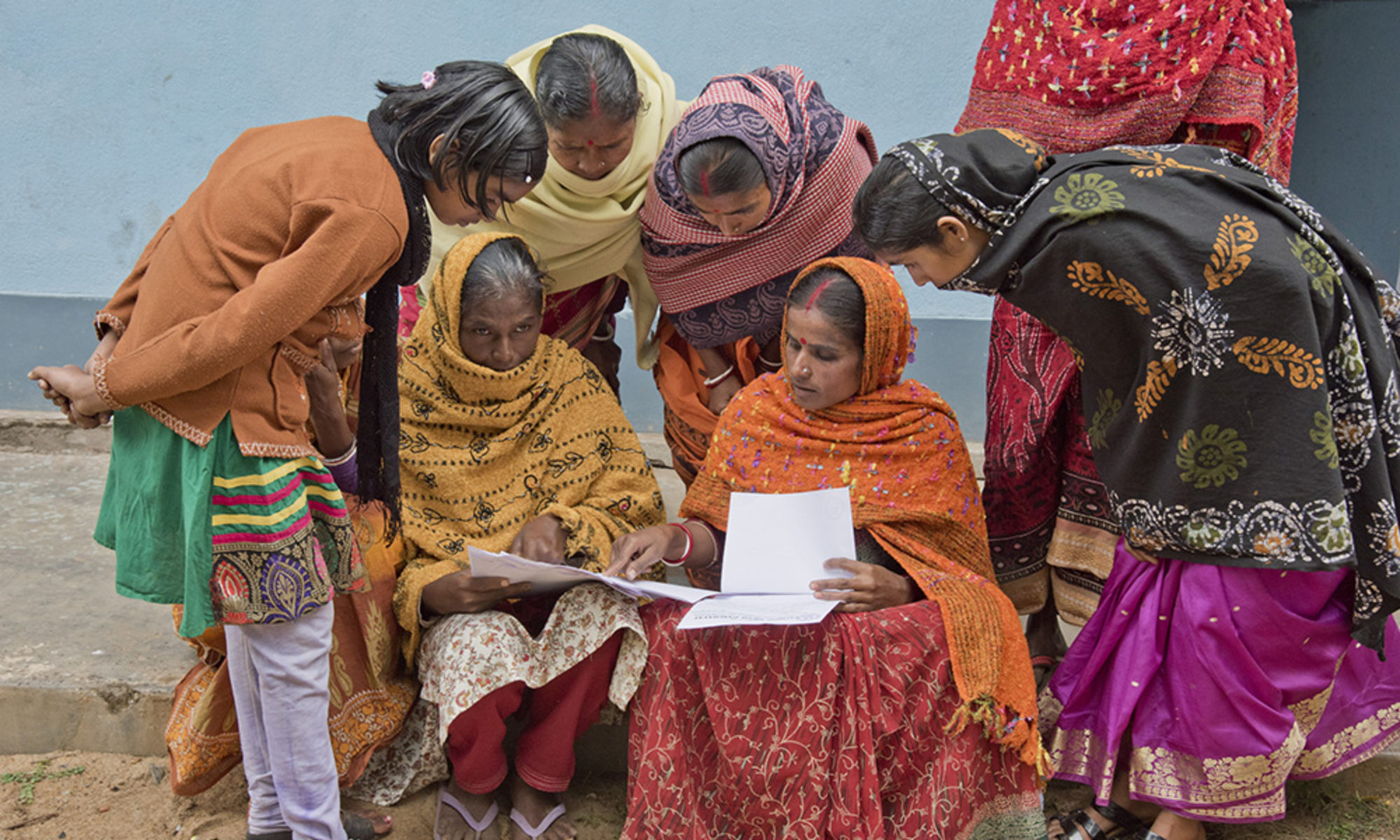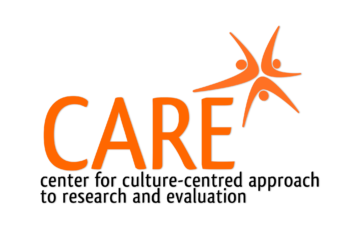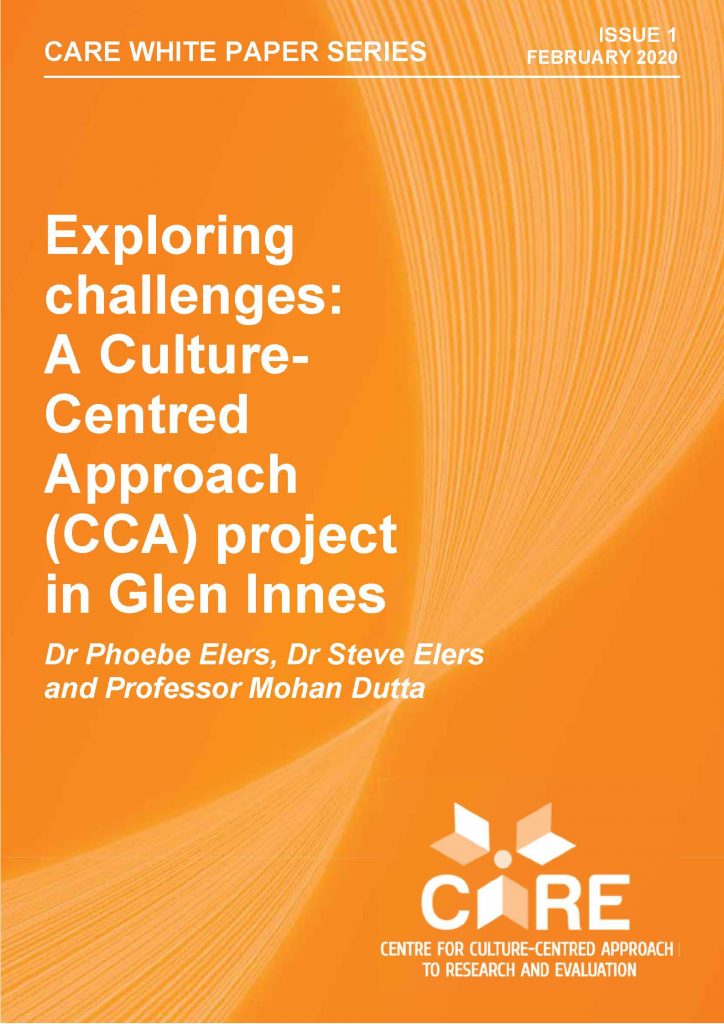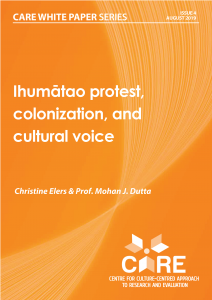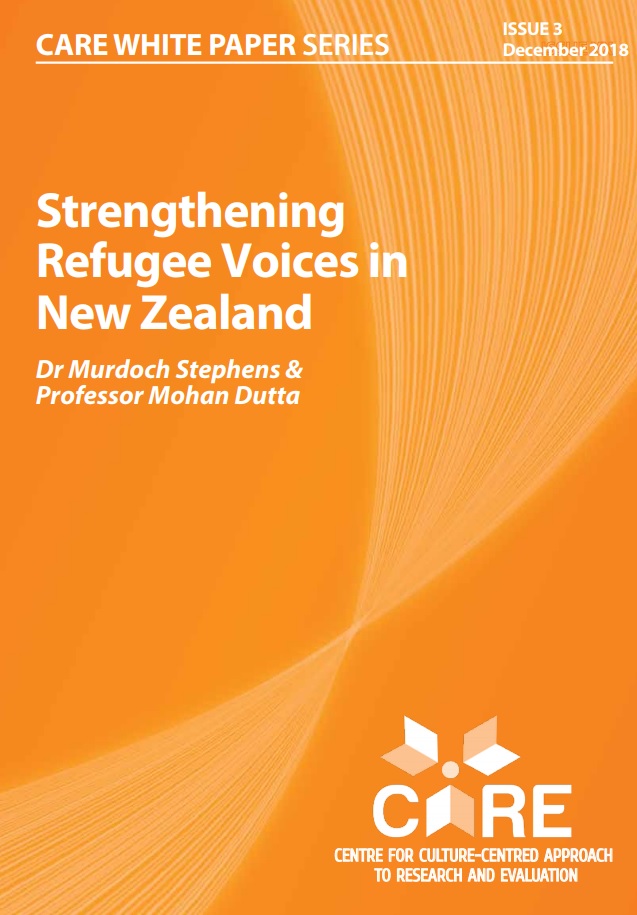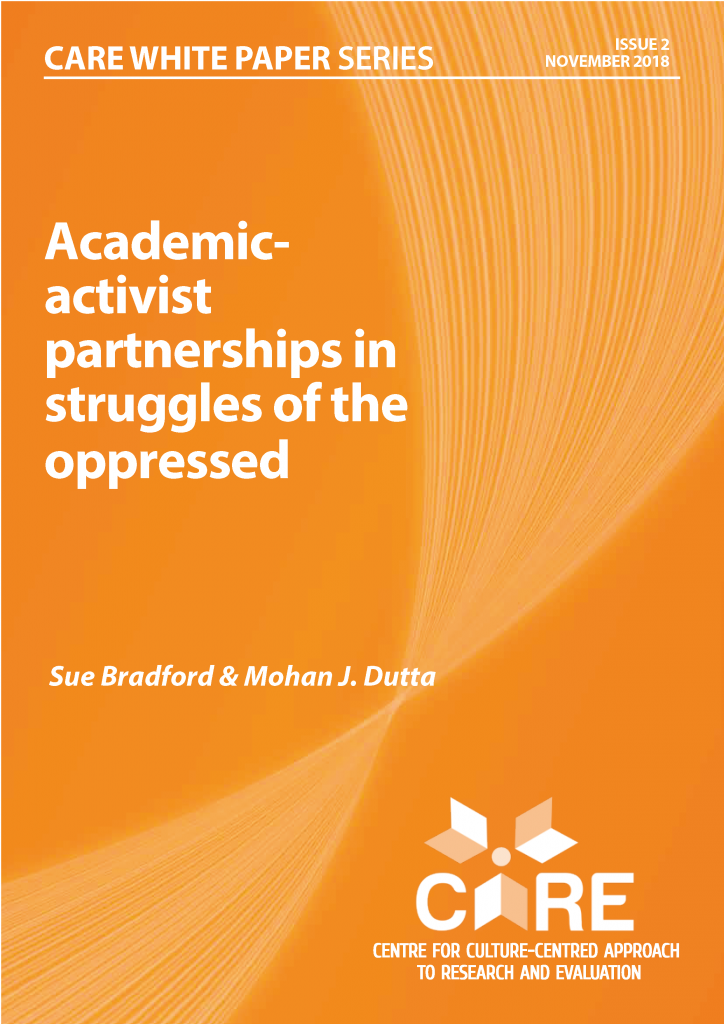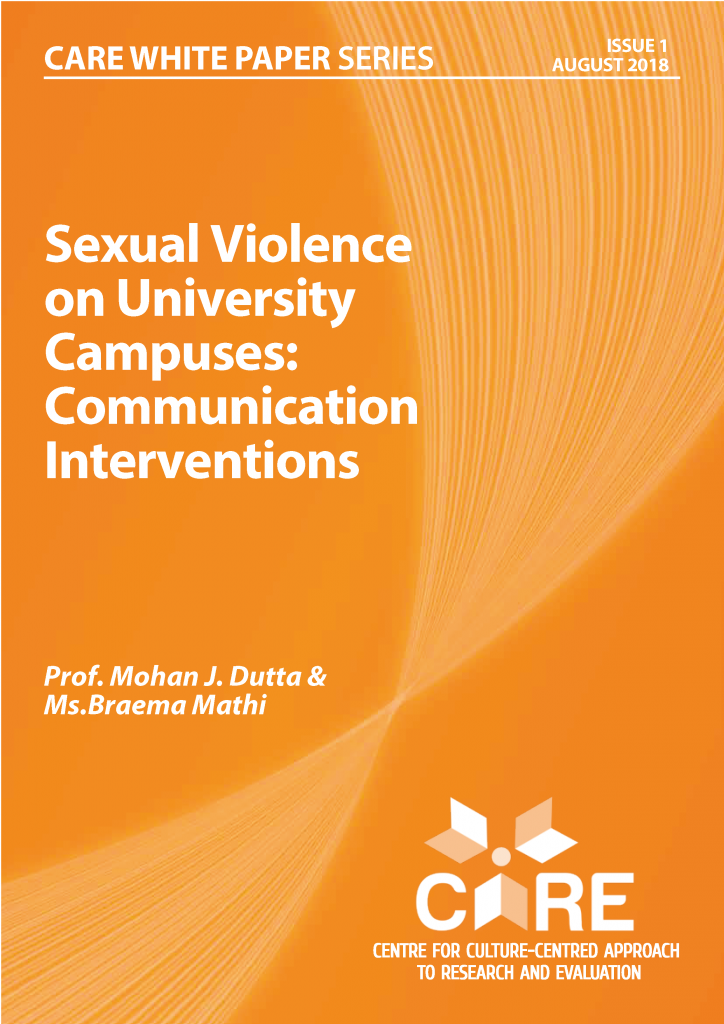JOURNAL ARTICLES AND BOOK CHAPTERS
2022
Mika, J. P., Dell, K., Elers, C., Dutta, M., & Tong, Q. (2022). Indigenous environmental defenders in Aotearoa New Zealand: Ihumātao and Ōroua River. AlterNative: An International Journal of Indigenous Peoples.Salter, L., & Dutta, M. (2022). Experiences with COVID-19 among gig workers.Dutta, M. J. (2022). De-centering the whiteness of applied communication research: some editorial strategies. Journal of Applied Communication Research, 50(2), 109-110.Elers, P., Dutta, M. J., & Elers, S. (2022). Culturally centring digital inclusion and marginality: A case study in Aotearoa New Zealand. New Media & Society, 24(2), 311–327. DOI: https://doi.org/10.1177/14614448211063180
2021
M Belarde-Lewis, S Cote-Meek, NAD Parkhurst, M Duarte, M Dutta…, Indigenous Peoples Rise Up: The Global Ascendency of Social Media Activism, Rutgers University Press
Lee, ST., Dutta, MJ., Luk, P., Kaur-Gill, S., & Lin, J. (2021). Health Orientation as a Psychographic Framework for Understanding Physical Exercise Behavior. Health Communication.
Sun, K., & Dutta, M. (2021). Grandparenting in rural China: A culture-centered approach (CCA) to understand economic inequality and rural labor change. Qualitative Social Work.
Dutta, MJ., & Elers, P. (2021). Negotiating Community-Academic-Activist Relationships Amidst the Pandemic. Communication, Culture and Critique. 14(2), 381-384
Dutta, MJ. (2021). Migrant health as a human right amidst COVID-19: a culture-centered approach. International Journal of Human Rights in Healthcare. 14(3), 223-239
Dutta, MJ. (2021). Neoliberal Governmentality and Low-Wage Migrant Labour in India and Singapore. Journal of Creative Communications. 16(2), 139-152
Elers, P., Elers, S., Dutta, MJ., & Torres, R. (2021). Applying the Cultured-Centered Approach to visual storytelling methods. Review of Communication. 21(1), 33-43
Dutta, MJ. (2021). Singapore’s Extreme Neoliberalism and the COVID Outbreak: Culturally Centering Voices of Low-Wage Migrant Workers. American Behavioral Scientist.
Dutta, MJ. (2021). Communication as praxis. Journal of Applied Communication Research. 49(1), 1-2
Elers, P., Dutta, MJ., & Elers, S. (2021). Engagement and the Nonprofit Organization: Voices from the Margins. Management Communication Quarterly. 35(3), 368-391
Dutta, MJ., & Pal, M. (2021). Theorizing from the global south: Dismantling, resisting, and transforming communication theory. Communication Theory. 30(4), 349-369
Elers, C., Jayan, P., Elers, P., & Dutta, MJ. (2021). Negotiating Health Amidst COVID-19 Lockdown in Low-income Communities in Aotearoa New Zealand. Health Communication. 36(1), 109-115
Falnikar, A., & Dutta, MJ. (2021). Bt cotton and the voices of the widows in the face of farmer-suicides. Journal of International and Intercultural Communication. 14(2), 95-111
2020
Vats, A., & Dutta, MJ. (2020). Locating freedom of speech in an era of global white nationalism. First Amendment Studies. 54(2), 156-180
Dutta, M., & Elers, P. (2020). Media narratives of kindness − a critique. Media International Australia. 177(1), 108-112
Dutta, MJ., Kaur, S., & Elers, P. (2020). Validity in interpretive methods: frameworks and innovations. Annals of the International Communication Association.
Dutta, MJ. (2020). Whiteness, internationalization, and erasure: decolonizing futures from the Global South. Communication and Critical/ Cultural Studies. 17(2), 228-235
Habersaat, KB., Betsch, C., Danchin, M., Sunstein, CR., Böhm, R., Falk, A., . . . Butler, R. (2020). Ten considerations for effectively managing the COVID-19 transition. Nature Human Behaviour. 4(7), 677-687
Elers, P., Te Tau, T., Dutta, MJ., Elers, S., & Jayan, P. (2020). Explorations of Health in Aotearoa New Zealand’s Low-income Suburbia. Health Communication.
Kaur-Gill, S., & Dutta, MJ. (2020). Structure as Depressant: Theorizing Narratives of Mental Health among Migrant Domestic Workers. Health Communication.
Dutta, M., & Thaker, J. (2020). Sustainability, Ecology, and Agriculture in Women Farmers’ Voices: Culture-Centering Gender and Development. Communication Theory. 30(2)
Schraedley, MK., Bean, H., Dempsey, SE., Dutta, MJ., Hunt, KP., Ivancic, SR., . . . Sellnow, T. (2020). Food (in)security communication: a forum addressing current challenges and future possibilities. Journal of Applied Communication Research. 48(2), 166-185
Kaur-Gill, S., & Dutta, MJ. (2020). Negotiating the (im)mobility of domestic work: Communicative erasures, disrupted embodiments, and neoliberal Asia. Journal of International and Intercultural Communication. 13(2), 130-150
Dutta, M.J., & Elers, S. (2020). Public relations, indigeneity and colonization: Indigenous resistance as dialogic anchor. Public Relations Review. 46(1)
2019
Chandanabhumma, P. P., Duran, B. M., Peterson, J. C., Pearson, C. R., Oetzel, J. G., Dutta, M. J., & Wallerstein, N. B. (2019). Space within the scientific discourse for the voice of the other? Expressions of community voice in the scientific discourse of community-based participatory research. Health communication, 1-12.
Dutta, M. J. (2019). What Is alternative modernity? Decolonizing culture as hybridity in the Asian turn. Asia Pacific Media Educator.
Dutta, M. J. (2019). Cultural imperialism and development communication for social change. In Oliver Boyd-Barrett and Tanner Mirrlees (Eds.), Title: Media Imperialism: Continuity and Change. Rowman & Littlefield.
Dutta, M. J. (2019). Introduction: Theory, method, and praxis of social change. In Communicating for Social Change (pp. 315-331). Palgrave Macmillan, Singapore.
Dutta, M. J. (2019). Culture-centered social change: From process to evaluation. In Communicating for Social Change (pp. 315-331). Palgrave Macmillan, Singapore.
Dutta, U., & Dutta, M. J. (2019). Songs of the Bauls: Voices from the margins as transformative infrastructures. Religions, 10(5), 335.
Dutta, M. J., & Elers, S. (2019). Public relations, indigeneity and colonization: Indigenous resistance as dialogic anchor. Public Relations Review, 101852.
Dutta, M. J., & Thaker, J. (2019). ‘Communication sovereignty’ as resistance: strategies adopted by women farmers amid the agrarian crisis in India. Journal of Applied Communication Research, 47(1), 24-46.
Falnikar, A., & Dutta, M. J. (2019). Voices of farmer-widows amid the agrarian crisis in India. Women’s Studies in Communication, 42(4), 432-451.
Falnikar, A., Tan, E., Ganchoudhuri, S., & Dutta, M. J. (2019). Discursive constructions of income inequality in neoliberal Singapore. Journal of Creative Communications, 14(2), 132–146. https://doi.org/10.1177/0973258619851979
Kaur-Gill, S., Pandi, A. R., & Dutta, M. J. (2019). Singapore’s national discourse on foreign domestic workers: Exploring perceptions of the margins. Journalism. https://doi.org/10.1177/1464884919879850
Neyazi, T., Kumar, A., & Dutta, M. J. (2019). Channel Complementarity or Displacement? Theory and Evidence from a non-Western Election Context. Journal of Broadcasting & Electronic Media.
Pitaloka, D., & Dutta, M. J. (2019). Embodied memories and spaces of healing: Culturally-centering voices of the survivors of 1965 Indonesian mass killings. In Communicating for Social Change (pp. 333-357). Palgrave Macmillan, Singapore.
Tan, E. L., & Dutta, M. J. (2019). Inequalities and workplace injuries: How Chinese workers cope with serious diseases caused by Benzene poisoning. In Communicating for Social Change (pp. 359-381). Palgrave Macmillan, Singapore.
Thaker, J., Dutta, M. J., Nair, V., & Rao, V. P. (2019). Media portrayal stigma among gender and sexual minorities. In Communicating for Social Change (pp. 383-407). Palgrave Macmillan, Singapore.
Wallerstein, N., Oetzel, J. G., Duran, B., Magarati, M., Pearson, C., Belone, L., … & Dutta, M. (2019). Culture-centeredness in community-based participatory research: contributions to health education intervention research. Health education research, 34(4), 372-388.
2018
Dutta, M. J. (2018). On Spivak. In O. Ihlen (Eds.), Public Relations and Social Theory: Key Figures, Concepts and Developments.
Dutta, M. J. (2018). Culture-centered approach in addressing health disparities: Communication infrastructures for subaltern voices. Communication Methods and Measures, 1-21.
Dutta, M. J. (2018). Culturally centering social change communication: subaltern critiques of, resistance to, and re-imagination of development. Journal of Multicultural Discourses, 1-18.
Dutta, M. J. (2018). Autoethnography as decolonization, decolonizing autoethnography: Resisting to build our homes. Cultural Studies↔ Critical Methodologies, 18(1), 94-96.
Dutta, M. J. (2018). Health Communication. In R. Heath & W. Johanssen (Eds.), The International Encyclopedia of Strategic Communication. John Wiley & Sons.
Dutta, M. J., Collins, W., Sastry, S., Dillard, S., Anaele, A., Kumar, R., … & Bonu, T. (2018). A culture-centered community-grounded approach to disseminating health information among African Americans. Health communication, 1-10.
Dutta, M. J., & Kaur-Gill, S. (2018). Precarities of migrant work in Singapore: Migration, (Im)mobility, and neoliberal governmentality. International Journal of Communication, 12, 19.
Dutta, M. J., & Shome, R. (2018). Mobilities, Communication, and Asia. Mobilities in Asia—Introduction. International Journal of Communication, 12, 19.
Dutta, M. J. (2018). Power and control in communication studies. In D. Cloud (Ed.), Oxford Research Encyclopedia of Communication. Oxford University Press.
Dutta, M. J. (2018). Health communication in global contexts. In D. Cloud (Ed.), Oxford Research Encyclopedia of Communication. Oxford University Press.
Dutta, M. J., & Basu, A. (2018). Subalternity, neoliberal seductions, and freedom: Decolonizing the global market of social change. Cultural Studies↔ Critical Methodologies, 18(1), 80-93.
Dutta, M. J., Comer, S., Teo, D., Luk, P., Lee, M., Zapata, D., … & Kaur, S. (2018). Health meanings among foreign domestic workers in Singapore: A culture-centered approach. Health communication, 33(5), 643-652.
Dutta, M. J., Kaur, S., Luk, P., Lin, J., & Lee, S. T. (2018). Health information seeking among Singaporeans: Roles and collective contexts. Health communication, 33(4), 433-442.
Dutta, M. J., Kaur-Gill, S., Tan, N., & Lam, C. (2018). mHealth, health, and mobility: A culture-centered interrogation. In mHealth Innovation in Asia (pp. 91-107). Springer, Dordrecht.
Ho, E. Y., Lie, S., Luk, P., & Dutta, M. J. (2018). Speaking of health in Singapore using the Singlish term “Heaty.” In Engaging and Transforming Global Communication through Cultural Discourse Analysis: A Tribute to Donal Carbaugh.
Lee, S. T., Dutta, M. J., Lin, J., Luk, P., & Kaur-Gill, S. (2018). Trust ecologies and channel complementarity for information seeking in cancer prevention. Journal of Health Communication, 23(3), 254-263.
Low, T. T., Chan, S. P., Wai, S. H., Ang, Z., Kyu, K., Lee, K. Y., Dutta, M. J., & Nang, T. (2018). The women’s heart health programme: a pilot trial of sex-specific cardiovascular management. BMC women’s health, 18(1), 56.
Ray, S., & Dutta, M. J. (2018). Insecure peace: understanding citizen and local government relations in a Maoist-affected region in India. Critical Asian Studies, 50(1), 37-57.
Thaker, J., & Dutta, M. J. (2018). Women farmers’ voices on climate change adaptation in India. In Environmental communication among minority populations (pp. 113-130). Routledge.
Thaker, J., Dutta, M., Nair, V., & Rao, V. P. (2018). The interplay between stigma, collective efficacy, and advocacy communication among men who have sex with men and transgender females. Journal of Health Communication, 23(7), 614-623.
2017
Basu, A., & Dutta, M. J. (2017). Subaltern Resistance Narratives and the Culture-Centered Approach: Inverting Public Health Discourse. In Thinking Through Resistance (pp. 34-50). Routledge.
Dutta, M. J. (2017). Negotiating health on dirty jobs: Culture-centered constructions of health among migrant construction workers in Singapore. In Culture, Migration, and Health Communication in a Global Context (pp. 45-59). Routledge.
Dutta, M. J. (2017). Culture-centered approach to social change communication. In L. Chen (Ed.), Intercultural Communication Handbook (pp. 309-329). De Greuter Mouton.
Dutta, M. J. (2017). Content effects: Personal and public health. In P. Rossler (Ed.), International Encyclopedia for Media Effects (pp. 1-14). John Wiley & Sons.
Dutta, M. J. (2017). Migration and health in the construction industry: Culturally centering voices of Bangladeshi workers in Singapore. International Journal of Environmental Research and Public Health, 14(2), 132.
Dutta, D., & Dutta, M. J. (2017). Cultural intelligence, postcolonial critique. The International Encyclopedia of Intercultural Communication, 1-7.
Dutta, M. J., & Kang, S. (2017). Complex structures: Meaning formation amid China’s new rural cooperative medical scheme. International Journal of Communication, 11, 26..
Dutta, M. J., Kaur-Gill, S., & Tan, N. (2017). Cultivation in health and risk messaging. In Oxford Research Encyclopedia of Health and Risk Message Design and Processing (pp. 1-15). Oxford University Press.
Dutta, M., Sastry, S., Dillard, S., Kumar, R., Anaele, A., Collins, W., … & Spinetta, C. (2017). Narratives of stress in health meanings of African Americans in Lake County, Indiana. Health communication, 32(10), 1241-1251.
Kaur‐Gill, S., & Dutta, M. J. (2017). Digital Ethnography. The International Encyclopedia of Communication Research Methods, 1-10.
Lin, J., & Dutta, M. J. (2017). A replication of channel complementarity theory among Internet users in India. Health communication, 32(4), 483-492.
Rao, A., & Dutta, M. J. (2017). Repertoires of collective action in an “IT City”: Urban civil society negotiations of offline and online spaces in Bangalore. Communication Monographs, 84(2), 221-240.
Sastry, S., & Dutta, M. J. (2017). Health communication in the time of Ebola: A culture-centered interrogation. Journal of health communication, 22(sup1), 10-14.
Tan, N., Kaur-Gill, S., Dutta, M. J., & Venkataraman, N. (2017). Food insecurity in Singapore: The communicative (dis) value of the lived experiences of the poor. Health communication, 32(8), 954-962.
2016
Dutta, M. J. (2016). A postcolonial critique of public relations. The Routledge Handbook of Critical Public Relations, (pp. 248-260). Routledge.
Dutta, M. (2016). Social Context of health and diversity issues. In Handbook of Qualitative Health Research for Evidence-Based Practice (pp. 7-20). Springer New York.
Dutta, M. J. (2016). Cultural context, structural determinants, and global health inequities: The role of communication. Frontiers in Communication. Opening grand challenge.
Dutta, M. J. (2016). Violence in Gaza: an academic-activist agenda for health communication. Health communication, 31(12), 1579-1581..
Dutta, M. J., Hingson, L., Anaele, A., Sen, S., & Jones, K. (2016). Narratives of Food Insecurity in Tippecanoe County, Indiana: Economic Constraints in Local Meanings of Hunger. Health communication, 31(6), 647-658. (Lead Article)
Dutta, M.J., & Kaur, S. (2016). Communicating the culture-centered approach to health disparities. In J. Yamasaki, P. Geist-Martin, & B. Sharf, Storied Health and Illness (pp. 333-357). Waveland Press Inc.
Dutta, M., & Rastogi, R. (2016). Deconstructing PRSP measurement: Participation as neoliberal colonization. Journal of Creative Communications, 11(3), 211-226.
Gao, H., Dutta, M., & Okoror, T. (2016). Listening to Chinese immigrant restaurant workers in the Midwest: Application of the culture-centered approach (CCA) to Explore Perceptions of Health and Health Care. Health communication, 31(6), 727-737.
Kaur, S., Tan, N., & Dutta, M. J. (2016). Media, migration and politics: The coverage of the Little India riot in the Straits Times in Singapore. Journal of Creative Communications, 11(1), 27-43.
Kang, S., & Dutta, M. J. (2016). Meanings of care: A culture-centered approach to left-behind family members in the countryside of China. Journal of health communication, 21(11), 1141-1147.
Dutta, M. J., & Sastry, S. (2016). Reading HIV/AIDS in the Indian Media: Social, cultural and economic constructions. In Liberalizing, Feminizing and Popularizing Health Communications in Asia (pp. 73-90). Routledge.
Thaker, J., & Dutta, M. (2016). Millet in our own voices: A culturally-centred articulation of alternative development by DDS women farmers’ sanghams. In Globalisation and the Challenges of Development in Contemporary India (pp. 131-144). Springer Singapore.
Jamil, R., & Dutta, M. (2016). Structural and cultural constructions of spirit healing in rural Bangladesh: A culture-centered approach. In D. L. Rubin & A. N. Miller (Eds.), Health communication and faith-based communities.
2015
Dutta, M. J. (2015). Cultural Discourses of Health. The International Encyclopedia of Language and Social Interaction.
Dutta, M. J. (2015). Decolonizing communication for social change: A Culture‐Centered approach. Communication Theory, 25(2), 123-143. (Lead Article)
Dutta, M. J. (2015). New communication technologies, social media, and public health. In R. Detels, M. Gulliford, Q. A. Karim, & C. C. Tan (Eds.) Oxford Textbook of Global Public Health.
Dutta, M. J., & Acharya, L. (2015). Power, control, and the margins in an HIV/AIDS intervention: A culture‐centered interrogation of the “Avahan” campaign targeting Indian truckers. Communication, Culture & Critique, 8(2), 254-272.
Dutta, M. J., & Kumar, R. (2015). Public relations and resistance: A culture-centered approach. In J. N. Kim, E-J KI, & J. Ledingham (Eds.), Public relations as relationship management. Routledge.
Rastogi, R., & Dutta, M. J. (2015). Neoliberalism, agriculture and farmer stories: Voices of farmers from the margins of India. Journal of Creative Communications, 10(2), 128-140.
Yehya, N. A., & Dutta, M. J. (2015). Articulations of health and poverty among women on WIC. Health communication, 30(12), 1223-1233.
2014
Dutta, M. J. (2014). A Culture-Centered Approach to Listening: Voices of Social Change. International Journal of Listening, 28(2), 67-81.
Dutta, M. J. (2014). Globalization Theory. In T. Thompson (Ed.), Encyclopedia of Health Communication. Sage
Dutta, M. J. (2014). Culture-centered approaches to health communication. In T. Thompson (Ed.), Encyclopedia of Health Communication. Sage
Dutta, M. J. (2014). Communities in health communication. In T. Thompson (Ed.), Encyclopedia of Health Communication. Sage
Dutta, M. J. (2014). Yoga, meditation, and Ayurveda. In T. Thompson (Ed.), Encyclopedia of Health Communication. Sage
Dutta, M. J. (2014). Cultural sensitivity approaches to health communication. In T. Thompson (Ed.), Encyclopedia of Health Communication. Sage
Dutta, M. J. (2014). Postcolonial theory and health communication. In T. Thompson (Ed.), Encyclopedia of Health Communication. Sage
Dutta, M. J. (2014). Public diplomacy, public relations and the Middle East: A culture-centered approach to power in global contexts. In International Public Relations and Public Diplomacy.
Dutta, M. J., & Sen, S. (2014). Coverage of the Financial Crisis in English Language Print Media in India Ideologies of Neoliberalism. Journal of Creative Communications, 9(3), 199-213.
Dillard, S. J., Dutta, M., & Sun, W. S. (2014). Culture-Centered Engagement With Delivery of Health Services: Co-Constructing Meanings of Health in the Tzu Chi Foundation Through Buddhist Philosophy. Health communication, 29(2), 147-156.
2013
Airhihenbuwa, C. O., & Dutta, M. J. (2013). New Perspectives on Global Health Communication: Affirming Spaces for Rights, Equity, and Voices. In R. Obregon & S. Waisbord (Eds.), Handbook of Global Health Communication.
Ban, Z., Sastry, S., & Dutta, M. (2013). “Shoppers’ Republic of China”: Orientalism in neoliberal US news discourse. Journal of International and Intercultural Communication.
Basu, A., & Dutta, M. (2013). Health and sex work: Structures as narrative nodes. In A. Misra & S. Chopra Chatterji (Eds.) Narratives of health and illness: Readings from Asia. Delhi: Orient Blackswan.
D’Enbeau, S., Munz, E., Wilson, S. R., & Dutta, M. J. (2013). Reflecting on evaluation research: Intersections of academy, community, and identity. Tamara Journal of Critical Organisation Inquiry, 11(4), 53.
Dutta, M. J. (2013). Disseminating HIV pre-exposure prophylaxis information in underserved communities. American Journal of Preventive Medicine44, S133-6.
Dutta, M. J. (2013) Health communication as health activism: The case of the campaign to stop the Gardasil clinical trials in India. In M. Dutta & G. Kreps (Eds.), Communicating health disparities. Peter Lang New York.
Dutta, M. J. (2013). Globalization, public relations, and activism for social change: A culture-centered approach. In K. Sriramesh, Z. Ansgar, & J. N. Kim (Eds), Public relations and communication management: Current trends and emerging topics. New York: Routledge.
Dutta, M., & Acharya, A. (2013). Culture-centered deconstructions: In-depth interviews with HIV planners targeting tribals in Orissa, India. In M. Dutta & G. Kreps (Eds.), Communicating health disparities. Peter Lang New York.
Dutta, M. J., & Anaele, A. (2013). Culture-centered resistance in the context of mining: The Ogoni resistance movement. In A. Singhal & G. Kreps (Eds.) Global health communication. Peter Lang.
Dutta, M. J., Anaele, A., & Jones, C. (2013). Voices of hunger: Addressing health disparities through the culture-centered approach. Journal of Communication, 63, 159-180.
Dutta, M., & Basu, A. (2013). Negotiating our postcolonial selves: From the ground to the ivory tower. In Holman-Jones, S., Adams, T., & Ellis, C. E. (Eds.), Handbook of autoethnography. Left Coast Press.
Dutta, M. J., Dillard, S., Kumar, R., Sastry, S., Jones, C., Anaele, A., Dutta, U., Collins, W., Okoror, T., & Robinson, C. (2013). Culture-centered approach to developing comparative effectiveness research summary guides (CERSGs) for African Americans in Lake and Marion Counties of Indiana. In M. J. Dutta & G. Kreps (Eds.) Communication interventions addressing health disparities. Peter Lang New York.
Dutta, M. J., & Dutta, D. (2013). Multinational going cultural: A postcolonial deconstruction of cultural intelligence. Journal of International and Intercultural Communication, 6, 241-258.
Dutta, M. J., & Dutta, U. (2013). Voices of the poor from the margins of Bengal: Structural inequities and health. Qualitative Health Research, 23, 14-25.
Dutta, M. J., & Jamil, R. (2013). Health at the margins of migration: Culture-centered co-constructions among Bangladeshi immigrants. Health communication, 28(2), 170-182.
Dutta, M. J., & Jones, C. (2013). Health inequalities in rural United States: Culture-centered co-constructions with healthcare providers. In M. J. Dutta & G. Kreps (Eds.) Communication interventions addressing health disparities. Peter Lang New York.
Pal, M., & Dutta, M. J. (2013). “Land is our Mother”: Alternative meanings of development in subaltern organizing. Journal of International and Intercultural Communication, 6, 203-220.
Sastry, S., & Dutta, Mohan, J. (2013). Global Health Interventions and the “common sense” of Neoliberalism: A dialectical analysis of PEPFAR. Journal of International and Intercultural Communication, 6, 21-39.
Mitra, R., Green, R. J., & Dutta, M. J. (2013). Corporate reputation in emerging markets: A culture-centered review and critique. In C. Carroll (Ed.), The Handbook of Communication and Corporate Reputation. Oxford: Blackwell Publishing.
2012
Acharya, L., & Dutta, M. J. (2012). Deconstructing the portrayals of HIV/AIDS among campaign planners targeting tribal populations in Koraput, India: A culture-centered interrogation. Health Communication, 27, 629-640.
Ban, Z., & Dutta, M. J. (2012). Minding their business: Discourses of colonialism and neoliberalism in the commercial guide for US companies in China. Public Relations Inquiry, 1, 197-200.
Dutta, M. J. (2012). Hunger as health: Culture-centered interrogations of alternative rationalities of health. Communication Monographs, 79, 366-384.
Dutta, M. (2012). Critical interrogations of global public relations: Power, culture, and agency. In K. Sriramesh & D. Vercic (Eds.), Cultural theories of public relations (pp. 202-217). Routledge.
Dutta, M. (2012). Health. In O. Patterson (Ed.), Cultural sociology of West, Central, & South Asia. Sage.
Dutta, M. (2012). Poverty. In O. Patterson (Ed.), Cultural sociology of West, Central, & South Asia. Sage.
Dutta, M. (2012). Prostitution. In O. Patterson (Ed.), Cultural sociology of West, Central, & South Asia. Sage.
Dutta, M., & Dutta, D. (2012). Science. In O. Patterson (Ed.), Cultural sociology of West, Central, & South Asia. Sage.
Dutta, M. (2012). AIDS. In O. Patterson (Ed.), Cultural sociology of West, Central, & South Asia. Sage.
Dutta, M. (2012). A culturally centered approach to communication for social change. In S. Melkote (Ed.) Development communication and directed change: A reappraisal of theories and practices.
Dutta, M. J., & Ban, Z. (2012). Minding their business: Discourses of colonialism and neoliberalism in the commercial guides for US companies in China. Public Relations Inquiry, 1, 197-220.
Dutta, M. J., Brockus, S., & Vercler, L. (2012). Television coverage of Operation Iraqi Freedom: The frames that made news. Journal of International Communication, 18, 156-173.
Jamil, R., & Dutta, M. J. (2012). A culture-centered exploration of health: Constructions from rural Bangladesh. Health Communication, 27, 369-379.
Koenig, C. J., Dutta, M. J., Kandula, L., & Palaniappan, L. (2012). “All of those things we don’t eat:” A culture-centered approach to dietary health meanings for Asian Indians living in the United States. Health Communication, 27, 818-828.
Pal, M., & Dutta, M. J. (2012). Organizing resistance on the internet: The case of the International Campaign for Justice in Bhopal. Communication, Culture, Critique, 5, 230-251.
Sastry, S., & Dutta, M. J. (2012). Public health, global surveillance, and the “emerging disease” worldview: A postcolonial appraisal of PEPFAR. Health Communication, 27, 519-532.
Basnyat, I., & Dutta, M. (2012). Reframing Motherhood Through the Culture-Centered Approach: Articulations of Agency Among Young Nepalese Women. Health Communication, 27, 273-283.
Airhihenbuwa, C. O., & Dutta, M. J. (2012). New Perspectives on Global Health Communication. The Handbook of Global Health Communication, 34-51.
Dutta, M., Zhuo, B., & Pal, M. (2012). Engaging worldviews, cultures, and structures through dialogue: The culture-centered approach to public relations. Prism, 9.
Dutta, M. (2012). Voices of resistance. West Lafayette, IN: Purdue University Press
2011
Basnyat, I., & Dutta, M. (2011). Reframing motherhood through the culture-centered approach: Articulations of agency among young Nepalese women. Health Communication, 27, 273-283.
Basnyat, I., & Dutta, M. (2011). Family Planning (re)Defined: How Young Nepalese Women Understand and Negotiate Contraceptive Choices. Asian Journal of Communication, 21, 338-354.
Basu, A., & Dutta, M. (2011). ‘We are mothers first’: Localocentric articulation of sex worker identity as a keyword in HIV/AIDS communication. Women & Health, 51, 106-123.
Dutta, M. (2011). Health, human right, and performance: Interrupted stories. Health Communication, 26, 679-682.
Dutta, M., & Basu, A. (2011). Culture, communication and health: A guiding framework. In T. Thompson, R. Parrott, & J. F. Nussbaum (Eds.) Routledge handbook of health communication (2nd ed). New York: Routledge.
Dempsey, S., Dutta, M. J., Frey, L. et al. (2011). What is the role of the communication discipline in social justice, community engagement, and public scholarship? Communication Monographs, 78, 256-271.
Sastry, S., & Dutta, M. (2011). Postcolonial constructions of HIV/AIDS: Meaning, culture, and structure. Health Communication, 26, 437-449.
Bodie, G., Dutta, M., & Basu, A. (2011). Social disparities in online health use: The integrative model of e-health use. In A. Lazakidou & K. Siassiakos (Eds.), Handbook of research on distributed medical informatics and e-health. Hershey, PA: Medical Information Science Reference.
Dutta, M. & Pal, M. (2011).Public relations in a global context: Postcolonial thoughts. In N. Bardhan & K. Weaver (Eds.), Public relations in global cultural contexts (pp. 195-225). New York: Routledge
Whitten, P, Dutta, MJ, Carpenter S, Bodie GD. (2011). News media and health care providers at the crossroads of medical adverse events. In: Henriksen K, Battles J, Keyes M, Grady ML, eds., Advances in patient safety: New directions and alternative approaches. Vol. 1, Assessment. AHRQ Pub. No. 08-0034-1. Rockville, MD: Agency for Healthcare Research and Quality.
2010
Basu, A., & Dutta, M. (2010). Born into Brothels: Neocolonial moves and unheard voices. Feminist Media Studies, 10, 101-105.
Dutta, M. (2010). The critical cultural turn in Health Communication: Reflexivity, solidarity, and praxis. Health Communication, 25, 534-539.
Dutta, M. (2010). The critical cultural turn in Health Communication: Reflexivity, solidarity, and praxis. Health Communication, 25, 534-539.
Dutta, M., & Basnyat, I. (2010). The Radio Communication Project in Nepal: Culture, power and meaning in constructions of health. In L. K. Khiun (Ed.), Liberalizing, Feminizing and Popularizing Health Communications in Asia (pp. 151-76). Burlington, VT: Ashgate.
Dutta, M., & Pal, M. (2010). Dialogue theory in marginalized settings: A Subaltern Studies approach. Communication Theory.
Paek, H-J., Lee, A. L., Jeong, S-H., Wang, J., & Dutta, M. (2010). The emerging landscape of health communication in Asia: Theoretical contributions, methodological questions, and applied collaborations. Health Communication, 25, 1-8.
Sastry, S. J., & Dutta, M. J. (2010). Reading HIV/AIDS in the Indian Media: social, cultural and economic constructions. In L. K. Khiun (Ed.), Liberalizing, Feminizing and Popularizing Health Communications in Asia (pp. 59-76). Burlington, VT: Ashgate.
Thompson, T. L., Stephenson, M., Southwell, B., & Dutta, M. (2010). The nuts and bolts of publication in Health Communication. Health Communication, 25, 512-515.
Yehya, N., & Dutta, M. (2010). Health, religion, and meaning: A culture-centered study of Druze women. Qualitative Health Research.
2009
Basu, A., & Dutta, M. (2009). Sex workers and HIV/AIDS: Analyzing participatory culture-centered health communication strategies. Human Communication Research, 35, 86-114.
Dutta, M.J., & Harter, L.M. (2009). Communicating for social impact in international contexts. In L.M. Harter & M. J. Dutta (Eds.), Communicating for social impact: Engaging communication theory, research, and practice (pp. 1-10). Creskill, New Jersey: Hampton Press.
Dutta, M. (2009). Theorizing resistance: Applying Gayatri Chakravorty Spivak in public relations. In Ihlen, Ø., van Ruler, B., & Fredrikson, M. Social theory on public relations. Routledge.
Harter, L. M., Dutta, M. J., Ellingson, L., & Norander, S. (2009). The poetic is political…and other notes on engaged communication scholarship. In L.M. Harter & M. J. Dutta (Eds.), Communicating for social impact: Engaging communication theory, research, and practice (pp. 33-46). Creskill, New Jersey: Hampton Press.
Kim, I., & Dutta, M. J. (2009). Studying crisis communication from the subaltern studies framework: Grassroots activism in the wake of Hurricane Katrina. Journal of Public Relations Research.
2008
Basu, A., & Dutta, M. (2008). Participatory change in a campaign led by sex workers: Connecting resistance to action-oriented agency. Qualitative Health Research, 18, 106-119.
Basu, A., & Dutta, M. (2008). The relationship between health information seeking and community participation: The roles of motivation and ability. Health Communication, 23, 70-79.
Bodie, G., & Dutta, M. (2008). A culture-centered approach to e-health literacy. Health Marketing Quarterly.
DeSouza, R., Basu, A., Kim, I., Basnyat, I., & Dutta, M. (2008). The paradox of “fair trade”: The influence of neoliberal trade agreements on food security and health. In Zoller, H., & Dutta, M. (Eds). Emerging perspectives in health communication: Interpretive, critical and cultural approaches (pp. 411-430). Mahwah, NJ: Lawrence Erlbaum Associates.
DeSouza, R., & Dutta, M. (2008). The Internet as a social network in health communication: The case of Saathii. Journal of Health Communication, 13, 326-3
Dutta, M. (2008). Participatory communication in entertainment education: A critical analysis. Communication for Development and Social Change: A Global Journal, 2, 53-72.
Dutta, M. (2008). A critical response to Storey and Jacobson: The co-optive possibilities of participatory discourse. Communication for Development and Social Change: A Global Journal, 2, 81-90.
Dutta, M. (2008). Health Marketing Quarterly Special Issue: Media strategy in health marketing. Health Marketing Quarterly.
Dutta, M., & Basnyat, I. (2008). Interrogating the Radio Communication Project in Nepal: The participatory framing of colonization. In Zoller, H., & Dutta, M. (Eds). Emerging perspectives in health communication: Interpretive, critical and cultural approaches (pp. 247-265). Mahwah, NJ: Lawrence Erlbaum Associates.
Dutta, M., & Basnyat, I. (2008). The Radio Communication Project in Nepal: A critical analysis. Health Education and Behavior.
Dutta, M., & Basnyat, I. (2008). A critical response to participatory hegemony. Health Education and Behavior.
Dutta, M., & Basu, A. (2008). Meanings of health: Interrogating structure and culture. Health Communication, 23, 560-572.
Dutta, M. J., Bodie, G. D., & Basu, A. (2008). Health disparity and the racial divide among the nation’s youth: Internet as an equalizer? In A. Everett (Ed.), MacArthur Foundation series on digital media and learning: Race and ethnicity (pp. 175-197). Cambridge, MA: The MIT Press.
Dutta, M., & DeSouza, R. (2008). Reconciling the past and present: Reflexivity in the critical-cultural approach to health campaigns. Health Communication, 23, 326-339.
Dutta, M., & Boyd, J. (2008). Turning “smoking man” images around: Portrayals of smoking in men’s magazines as a blueprint for smoking cessation campaigns. Health Communication, 22, 253-263.
Dutta, M., & King, A. (2008). Communicative choices of the uninsured. Health Marketing Quarterly.
Dutta, M., & Zoller, H. (2008). Theoretical foundations: Interpretive, critical and cultural approaches to health communication. In Zoller, H., & Dutta, M. (Eds). Emerging perspectives in health communication: Interpretive, critical and cultural approaches (pp. 1-27). Mahwah, NJ: Lawrence Erlbaum Associates.
Dutta, M., & Zoller, H. (2008). Introduction: Popular discourse and constructions of health and healing. In Zoller, H., & Dutta, M. (Eds). Emerging perspectives in health communication: Interpretive, critical and cultural approaches (pp. 30-38). Mahwah, NJ: Lawrence Erlbaum Associates.
Dutta, M., & Zoller, H. (2008). Introduction: Culture in health communication. In Zoller, H., & Dutta, M. (Eds). Emerging perspectives in health communication: Interpretive, critical and cultural approaches (pp. 147-154). Mahwah, NJ: Lawrence Erlbaum Associates.
Pal, M., & Dutta, M. (2008). Public relations in a global context: The relevance of critical modernism as a theoretical lens. Journal of Public Relations Research, 20, 159-179. (Lead Article)
Pal, M., & Dutta, M. (2008). Theorizing resistance in a global context: Processes, strategies and tactics in communication scholarship. Communication Yearbook, 32, 41-87.
Zoller, H., & Dutta, M. (2008). Introduction: Medical communication. In Zoller, H., & Dutta, M. (Eds). Emerging perspectives in health communication: Interpretive, critical and cultural approaches (pp. 267-274). Mahwah, NJ: Lawrence Erlbaum Associates.
Zoller, H., & Dutta, M. (2008). Introduction: Communication and health policy. In Zoller, H., & Dutta, M. (Eds). Emerging perspectives in health communication: Interpretive, critical and cultural approaches (pp. 358-364). Mahwah, NJ: Lawrence Erlbaum Associates.
Zoller, H., & Dutta, M. (2008). Afterword: Emerging agendas in health communication and the challenge of multiple perspectives. In Zoller, H., & Dutta, M. (Eds). Emerging perspectives in health communication: Interpretive, critical and cultural approaches (pp. 449-463). Mahwah, NJ: Lawrence Erlbaum Associates.
2007
Dutta, M. (2007). Communicating about culture and health: Theorizing culture-centered and cultural-sensitivity approaches. Communication Theory, 17, 304-328.
Dutta, M. (2007). Health information processing from television: The role of health orientation. Health Communication, 21, 1-9. (Lead Article)
Dutta, M. (2007). The Ten Commandments of reviewing. Health Communication.
Dutta, M., & Basu, A. (2007). Health among men in rural Bengal: Approaching meanings through a culture-centered approach. Qualitative Health Research, 17, 38-48.
Dutta, M., & Basu, A. (2007). Centralizing context and culture in the co-construction of health: Localizing and vocalizing health meanings in rural India. Health Communication, 21, 187-196.
Dutta, M., & Feng, H. (2007). Health orientation and disease state as predictors of online health support group use. Health Communication, 22, 181-189.
2006
Dutta, M. (2006). Theoretical approaches to entertainment education: A subaltern critique. Health Communication, 20, 221-231.
Dutta, M., & Bodie, G. (2006). Health orientation as a predictor of exercising: A psychographic approach. Social Marketing Quarterly, 12, 3-18. (Lead Article)
Dutta-Bergman, M. (2006). U.S. public diplomacy in the Middle East: A critical approach. Journal of Communication Inquiry, 30, 102-124. (Lead Article)
Dutta-Bergman, M. (2006). A psychographic approach to attitudes toward advertising: Utility and regulation. Journal of Advertising Research, 46, 102-112.
Dutta-Bergman, M. (2006). The antecedents of community-oriented Internet use: Community participation and community satisfaction. Journal of Computer-Mediated Communication, 11(1), article 5. http://jcmc.indiana.edu/vol11/issue1/dutta_bergman.html.
Dutta-Bergman, M. (2006). Motivation-based approaches to health uses of the Internet. In R. Rice & M. Murerro (Eds.), The Internet and health care: Theory, research, and practice (pp. 83-105). Mahwah, NJ: Lawrence Erlbaum Associates.
Dutta-Bergman, M., & Mattson, M. (2006). Decomplexifying risk and crisis communication strategies in response to bioterrorism. In S. Amass, & A. Chaturvedi, Advances in homeland security, Vol. 1 (pp. 11-36). West Lafayette, IN: Purdue University Press.
Madhavan, K.P.C., Dutta-Bergman, M.J., & Arns, L.L. (2006). Pedagogical e-learning frameworks using advanced 3D visualization for bio-terror crises communication training. In S. Amass, A. Chaturvedi, and S. Peeta. (eds.) Advances in Homeland Security. Vol. 2. Guiding Future Homeland Security Policy – Directions for Scientific Inquiry (pp. 33-53). West Lafayette, IN: Purdue University Press.
Zollinger TW, Saywell RM, Overgaard AD, Przybylski MJ, & Dutta-Bergman M. (2006). Anti-tobacco Media Awareness of Rural Youth Compared to Suburban and Urban Youth in Indiana. Journal of Rural Health, 22, 119-123.
2005
Dutta-Bergman, M. (2005). Operation Iraqi Freedom: Mediated public sphere as a public relations tool. Atlantic Journal of Communication, 13, 220-241.
Dutta-Bergman, M. (2005). Community participation and Internet use after 9/11: The theory of channel complementarity. Journal of Computer Mediated Communication, 11(2), Article 4, http://jcmc.indiana.edu/vol11/issue2/dutta-bergman.html.
Dutta-Bergman, M. (2005). Developing a profile of consumer intention to seek out additional health information beyond a doctor: The role of communicative and motivation variables. Health Communication, 17, 1-16. (Lead Article)
Dutta-Bergman, M. (2005). A formative approach to strategic message targeting through soap operas: Using selective processing theory. Health Communication, 19, 11-18.
Dutta-Bergman, M. (2005). The readership of health magazines: The role of health orientation. Health Marketing Quarterly, 22, 27-49.
Dutta-Bergman, M. (2005). Access to the Internet in the context of community participation and community satisfaction. New Media and Society, 7, 89-109.
Dutta-Bergman, M. (2005). Idiocentrism, involvement, and health appeals: A social-psychological framework. Southern Communication Journal, 70, 46-55.
Dutta-Bergman, M. (2005). The relationship among health orientation, provider-patient communication, and satisfaction: An individual difference approach. Health Communication, 18, 291-303.
Dutta-Bergman, M. (2005). Psychographic profiling of fruit and vegetable consumption: The role of health orientation. Social Marketing Quarterly, 11, 1-20.
Dutta-Bergman, M. (2005). Depression and News Gathering After September 11: The Interplay of Affect and Cognition.Communication Research Reports.
Dutta-Bergman, M. (2005). Civil society and communication: Not so civil after all. Journal of Public Relations Research, 17(3), 267–289.
Dutta-Bergman, M. (2005). Theory and practice in health communication campaigns: A critical interrogation. Health Communication, 18(2), 103–12. (Lead Article)
Dutta-Bergman, M, & Pal, M. (2005). Advertising and culture: American advertising in the eyes of Indian immigrants. Journal of Communication Inquiry, 29, 1-20.
2004
Dutta-Bergman, M. (2004). Reaching unhealthy eaters: Applying a strategic approach to media vehicle choice. Health Communication, 16, 493-506.
Dutta-Bergman, M. (2004). An alternative approach to social capital: Exploring the linkage between health consciousness and community participation. Health Communication, 16, 393-409.
Dutta-Bergman, M. (2004). Describing volunteerism: The theory of unified responsibility. Journal of Public Relations Research, 16, 353-369.
Dutta-Bergman, M. (2004). Interpersonal communication after 9/11 via the telephone and the Internet: Theory of channel complementarity. New Media and Society, 6, 661-675.
Dutta-Bergman, M. (2004). Poverty, structural barriers and health: A Santali narrative of health communication. Qualitative Health Research, 14, 1-16.
Dutta-Bergman, M. (2004). The unheard voices of Santalis: Communicating about health from the margins of India. Communication Theory, 14, 237-263.
Dutta-Bergman, M. (2004). Developing a profile of consumer intention to seek out health information beyond the doctor. Health Marketing Quarterly, 21, 91-112.
Dutta-Bergman, M. (2004). Primary sources of health information: Comparison in the domain of health attitudes, health cognitions, and health behaviors. Health Communication, 16, 273-288.
Dutta-Bergman, M. (2004). The impact of completeness and Web use motivation on the credibility of e-Health information. Journal of Communication,54, 253-269.
Dutta-Bergman, M. (2004). Health attitudes, health cognitions and health behaviors among Internet health information seekers: Population-based survey. Journal of Medical Internet Research, 6, e15. Retrieved June 2, 2004, from http://www.jmir.org/2004/2/e15/index.htm
Dutta-Bergman, M. (2004). An alternative approach to entertainment education. Journal of International Communication, 10, 93-107.
Dutta-Bergman, M. (2004). Complementarity in consumption of news types across traditional and new media. Journal of Broadcasting and Electronic Media, 48, 41-60.
Dutta-Bergman, M. (2004). A descriptive narrative of healthy eating: A social marketing approach using psychographics. Health Marketing Quarterly, 20, 81-101.
2003
Babrow, A., & Dutta-Bergman, M. (2003). Constructing the uncertainties of bioterror: A study of U.S. news reporting on the anthrax attack of Fall, 2001. In C. B. Grant (Ed.), Rethinking communicative interaction: New interdisciplinary horizons (pp. 31-60). Amsterdam, Netherlands: John Benjamins Press.
Dutta-Bergman, M. (2003). Health communication on the Web: The roles of web use motivation and information completeness. Communication Monographs, 70, 264-274.
Dutta-Bergman, M. (2003). Trusted online sources of health information: Differences in demographics, health beliefs, and health-information orientation. Journal of Medical Internet Research, 5, e21. Retrieved June 2, 2004, from http://www.jmir.org/2003/3/e21/index.htm
Dutta-Bergman, M. (2003). Demographic and psychographic antecedents of community participation: Applying a social marketing model. Social Marketing Quarterly, 9, 17-31.
Dutta-Bergman, M. (2003). The linear interaction model of personality effects in health communication. Health Communication, 15, 101-115.
2002 and earlier
Dutta-Bergman, M., & Wells, W. D. (2002). The values and lifestyles of idiocentrics and allocentrics in an individualist culture. Journal of Consumer Psychology, 12, 42-54.
Dutta-Bergman, M. (2002). Beyond demographic variables: Using psychographic research to narrate the story of Internet users. Studies In Media & Information Literacy Education [an electronic journal], 2, 25 pages.
Dutta-Bergman, M., & Doyle, K. (2001). Money and meaning in India and Great Britain: Tales of similarities and differences. American Behavioral Scientist, 45, 216-233.
Wan, F., Dutta-Bergman, M., & Doyle, K. (2001). Who consumes the print media: A psychological exploration of media use. In D. Muehling (Ed.), Proceedings of the American Academy of Advertising, 119-127.
Dutta, M. (2000). Brides and grooms in the Indian marketplace: An analysis of Indian matrimonial ads. In M. A. Shaver (Ed.), Proceedings of the American Academy of Advertising, 136-140.
Dutta, M. (2000). Integration of the information processing and experiential perspectives. In M. A. Shaver (Ed.), Proceedings of the American Academy of Advertising, 54-59.
Dutta, M., & Vanacker, B. (1999). The effect of personality on persuasive appeals in health communication. In S. Hoch & R. Meyer (Eds.), Advances in Consumer Research, 42, 32-38.
Dutta, M., & Youn, S. (1999). Profiling healthy eating consumers: A psychographic approach to social marketing. Social Marketing Quarterly, 5, 5-21.
Dutta, M. (1998). The metaphoric paradox of “City of Joy.” Proceedings of The 13th Annual Red River Student Communication Conference.
Dutta, M. (2008). Communicating health: A culture-centered approach. London, UK: Polity Press.
Zoller, H., & Dutta, M. (Eds). (2008). Emerging perspectives in health communication: Meaning, culture, and power. Taylor & Francis.
Harter, L., Dutta, M., & Cole, C. (2009). Communication for social impact: Engaging communication theory, research, and practice. Hampton Press.
Dutta, M. (2011). Communication social change: Structure, culture, agency. Taylor & Francis.
Dutta, M. J. (2012). Voices of resistance. West Lafayette, IN: Purdue University Press.
Kreps, G., & Dutta, M. (Eds). (2013). Communication and health disparities. Peter Lang.
Dutta, M. J. (2015). Neoliberalism, communication, and health: Critical interrogations. New York: Routledge.
Dutta, M. J. (2017). Imagining India in discourse: Meaning, power, structure. New York: Springer.
Dutta, M. J., & Zapata, D. (2019). Communicating for social change. Singapore: Palgrave Macmillan.
Dutta, M. J. (2020). Communication, culture, and social change. Singapore: Palgrave Macmillan.
Dutta, M. J. (in contract). Power, culture, and communication: Health at margins of China. Michigan: University of Michigan Press.
Dutta, M. J. (in contract). Decolonizing communication. Peter Lang.
Dutta, M. J., & Kang, S. (in contract). Migration, health, and meaning: Left behind families in China. New York: Routledge.
CARE White Paper – ISSUE 11 (MAY 2021)
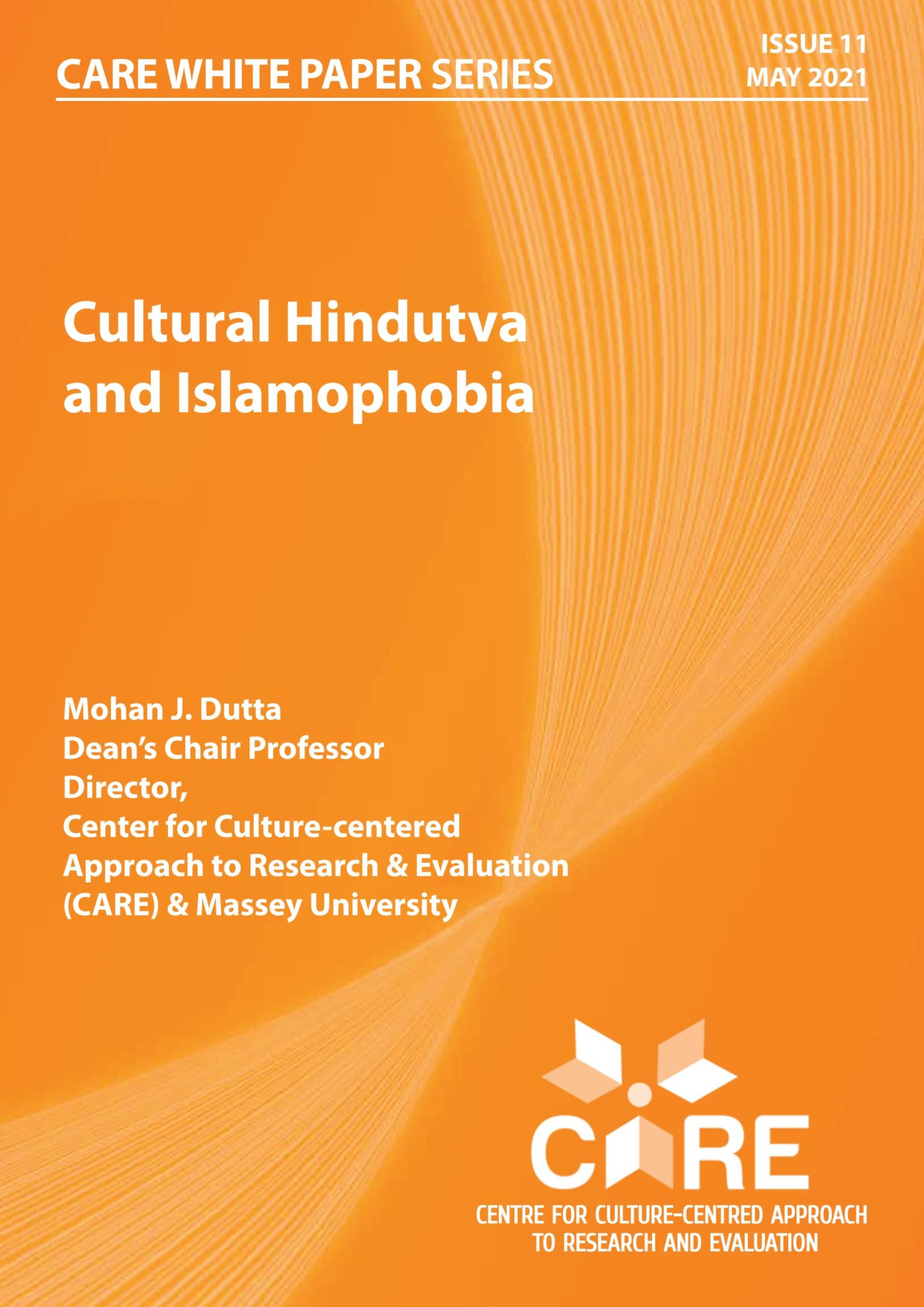
Cultural Hindutva and Islamophobia
Cultural Hindutva is a key resource of the Hindutva ideology, asserting the supremacy of Hindu nationalism through cultural forms, artefacts, and performances(i). Hindu nationalism organizes around the political conceptualization of India as a Hindu nation, working simultaneously through the erasure of Christians and Muslims that are portrayed as invaders. Of particular salience to Hindutva is the portrayal of the Muslim invader(ii), re-structuring India as a nation on the principles of Islamophobia, through the disenfranchisement of the Muslim other(iii).
2020
CARE White Paper – ISSUE 10. VOL 2 SEPTEMBER 2020
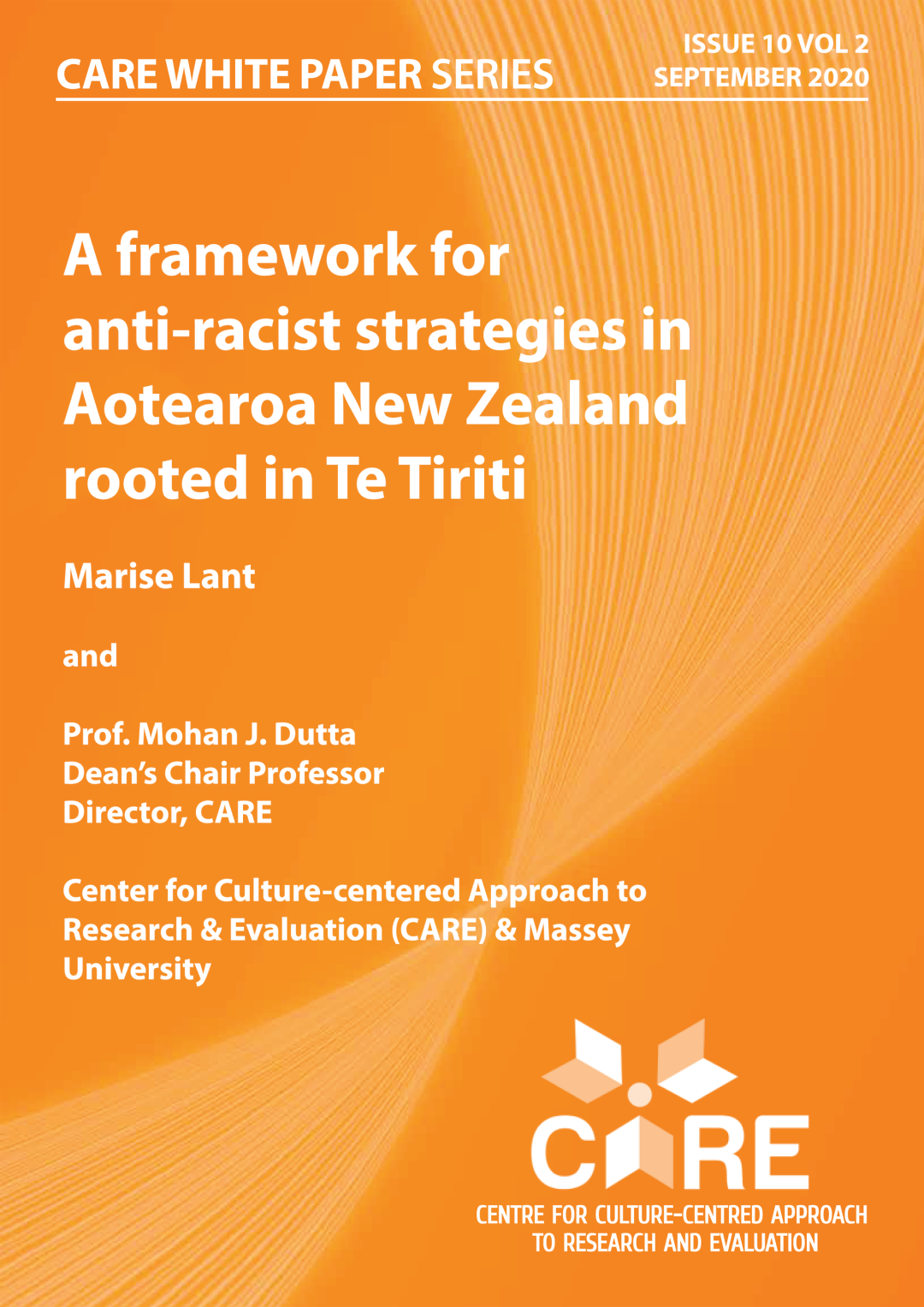
Connecting across cultures: A framework for anti-racist strategies in Aotearoa New Zealand rooted in Te Tiriti
In this white paper [1], we outline the vitality of connecting across cultures, anchored in Māori leadership in shaping and guiding anti-racist interventions in Aotearoa New Zealand, connected to anti-colonial struggles by Māori. Noting that the entrenched settler colonialism in New Zealand is based on a history of Whiteness[2], we argue that witnessing this Whiteness in the colonial configuration of New Zealand is the first step to dismantling it[3]. Māori have historically experienced, negotiated and resisted the racist structures of Whiteness that form the architectures of settler colonialism in New Zealand through their everyday organizing across whanau and hapū. We center Whiteness to the colonial structures of racism in New Zealand because of the centering of White norms as the basis for perpetuating oppression, expulsion, genocide, rape, and murder of indigenous communities (Māori in New Zealand) and the simultaneous marginalisation of communities of colour, many of whom have experienced similar histories of expulsion, genocide, and violence.
ISSUE 10. (SEPTEMBER 2020)
Digital Hate and the infrastructures of communicative capital
by Prof. Mohan Dutta,Director, CARE Massey University

Communicative capital, the consolidation of communicative infrastructures to drive profiteering, forms the face of twenty-first century neoliberalism. From Facebook to Amazon, digital communication is one of the most profitable sites of capitalist expansion.
Communicative capital is intertwined with financial and technological capital, drawing on the global networks of finance and simultaneously creating new sites and spaces for financialization.
Communicative capital works through the commercialization of human participation on digital platforms, turning likes, shares, and comments into profitable resources.
Of the wide array of human emotions on digital platforms that drive profiteering, hate is a powerful resource that draws in viewers, propels shares, and creates networks of flow. Hate has the potential of generating large profits because of its virality.
ISSUE 9. (JULY 2020)
Relocating the Health of Transgender Sex Workers in Singapore from the Margins: A Culture-Centered Approach
CARE White Paper Issue 9 July 2020Download
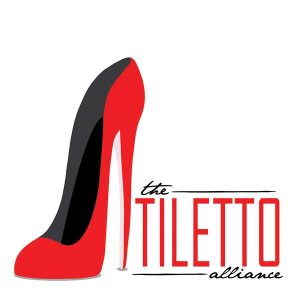
While there is high visibility of LGBT advocacy in Singapore, transgender[1] persons comprise a small, marginalized portion of the community, an even smaller proportion of which tend to go into sex work at a young age for various economic, social and cultural factors. Transgender sex workers (TSW) in Singapore comprise a marginalized community that has been identified by health authorities as one that is high risk of HIV/AIDS and other STIs, as with cisgender[2] female sex workers. They are further marginalized for their status as sex workers in an Asian society where sex outside of marriage is considered deviant behavior (Banerjee, 2000; Allard K Lowenstein Human Rights Clinic, 2015). Sex work for transgender persons embodies an array of vulnerabilities ranging from income instability and health insecurities to everyday experiences of discrimination and communicative inequalities in articulating the problems faced by transgender sex workers (Perez-Brumer, 2016). Neoliberal state laws and policies in Singapore acknowledge that while sex work cannot be eradicated as this may force the activities underground and encourage organized crime, sex trafficking and public health risks (Singapore Parliament Reports), these laws do not deem sex work itself as illegal, but criminalize sex work-related activities such as soliciting, pimping, and owning brothels (Misc. Offences Act Art 19; Women’s Charter Art 146; Women’s Charter Art 148). Migrant sex workers are increasingly vulnerable, and may face arrest, fines, deportation and bans from the state for 3 years or more (Immigration Act Art 8(3)(e)(f); Allard K Lowenstein Human Rights Clinic, 2015).
[1] We use transgender as an umbrella term for persons who challenge gender normativity, which includes persons who identify as transfeminine, transmasculine, transsexual, hijra, genderqueer, female-to-male (FTM), male-to-female (MTF), intersex and more. In general, transgender refers to someone whose gender differs from that assigned at birth.
[2] ‘Cisgender’ refers to a person whose gender identity i.e. woman or man aligns with their assigned sex at birth.
ISSUE 8. (APRIL 2020)
Structural constraints, voice infrastructures, and mental health among low-wage migrant workers in Singapore: Solutions for addressing COVID19
Mohan J. Dutta Director, Center for Culture-centered Approach to Research & Evaluation, Massey University
CARE White Paper Issue 8 April 2020Download

Foreign migrant workers washing luxury condo in Singapore
Responding to the continued rise in COVID19 clusters in migrant worker dormitories in Singapore, and building on earlier research (See CARE White paper Issue 6), this White Paper reports on the findings of a survey conducted with low-wage migrant workers in Singapore. In addition to the poor living conditions highlighted earlier, the structural constraints on preventive behavior are explored. Drawing on the key tenets of the culture-centered approach, the research highlights the powerful role of structural factors such as arrangements of dormitories, the absence of hygienic conditions because of the structures, the lack of clean toilets, pressure on limited toilets, and scarcity of water. The findings highlight the challenges to mental health and wellbeing experienced by the workers. Moreover, it points to the absence of voice infrastructures, and the ways in which this absence contributes to conditions that are rife for the pandemic. Solutions for structural solutions and voice democracy are offered.
ISSUE 7. (APRIL 2020)
Culture-centered community-led testing
Gayle Moana – Johnson, CARE – Community Research Assistant and Mohan J. Dutta, Director,Center for Culture – centered Approach to Research & Evaluation Massey University
CARE White Paper Issue 7 April 2020Download
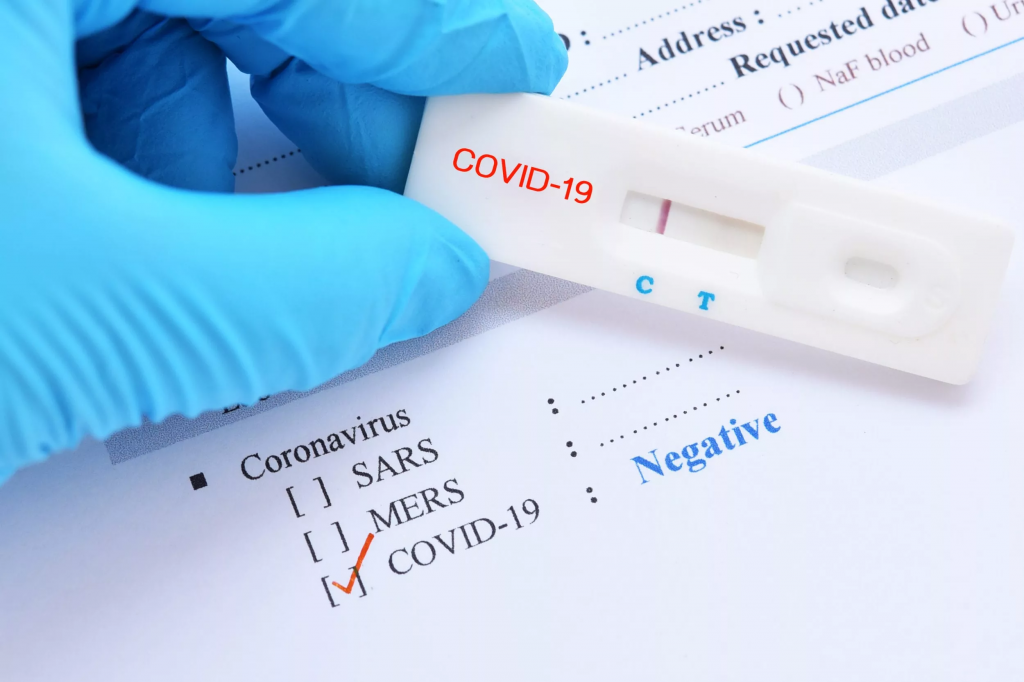
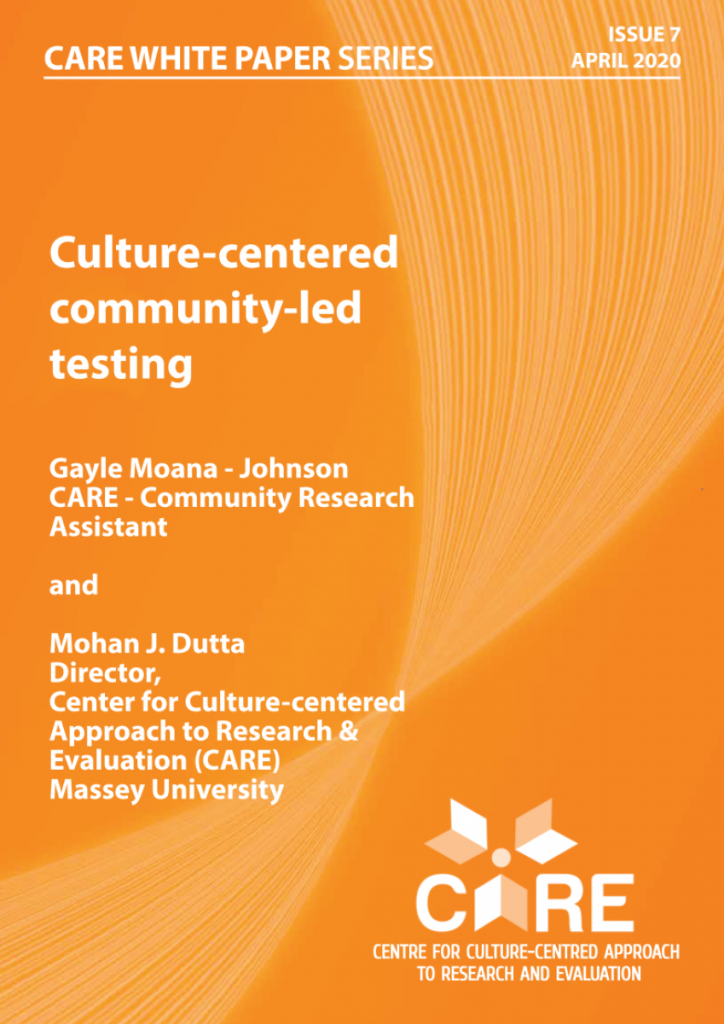
In this white paper, the community advisory group in Highbury, working with community researcher Gayle Moana-Johnson, developed the key conceptual guidelines for culture-centered community-grounded testing. The white paper highlights the key concepts anchoring the partnership between the community advisory group and the clinical team at HHPNZ
This white paper outlines the key principles of culture-centered community-led testing that are voiced by the advisory group of community members in Highbury, anchored in the principle of representing the most “in-need” members of the community (referred in the rest of this white paper as the “margins of the margins”). The key ideas in this white paper are developed as anchoring principles for the partnership between the community advisory group and the Health Hub Project New Zealand (HHPNZ).
ISSUE 6. (APRIL 2020)
Infrastructures of housing and food for low-wage migrant workers in Singapore
Mohan J. Dutta Director, Center for Culture-centered Approach to Research & Evaluation, Massey University
CARE_COVID19_whitepaper_MigrantInfrastructuresEmbargoedDownload
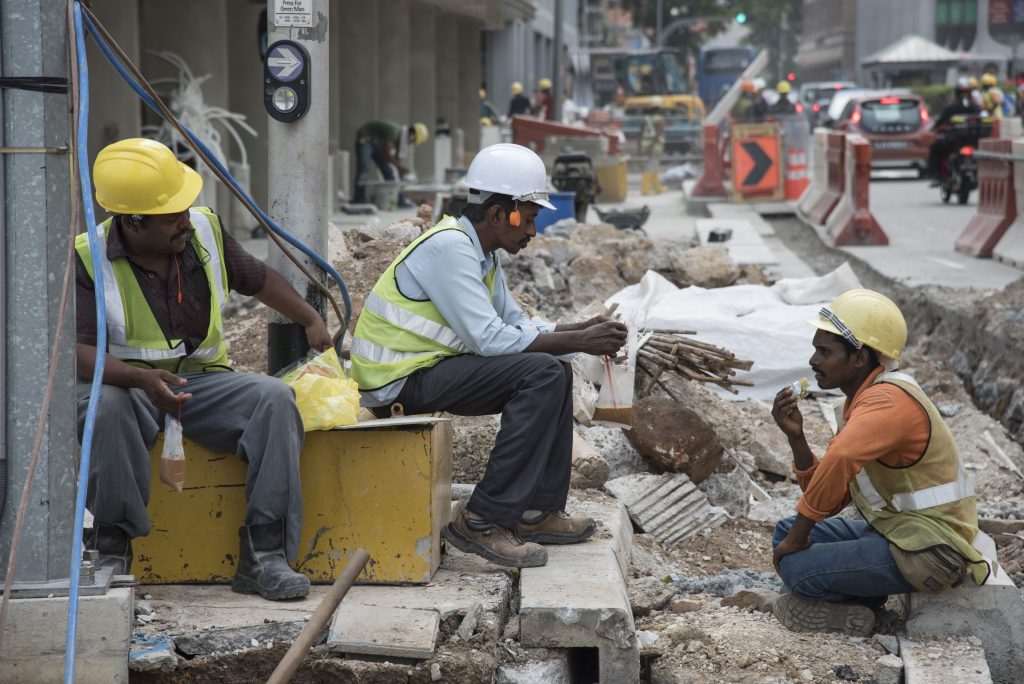
The high incidence of COVID-19 cases in dormitories housing low-wage migrant workers in Singapore makes visible the structural challenges of poor housing and food. Building on CARE’s ongoing work with low-wage migrant workers in Singapore, this white paper presents imaginaries for healthy housing and food voiced by low-wage migrant workers.
ISSUE 5. (APRIL 2020)
Challenges To Seeking Health Information And Healthcare Among
Low Income Communities Amid COVID19
Mohan J. Dutta Director, Center for Culture-centered Approach to Research & Evaluation, Massey University
CARE White Paper Issue 5 April 2020Download
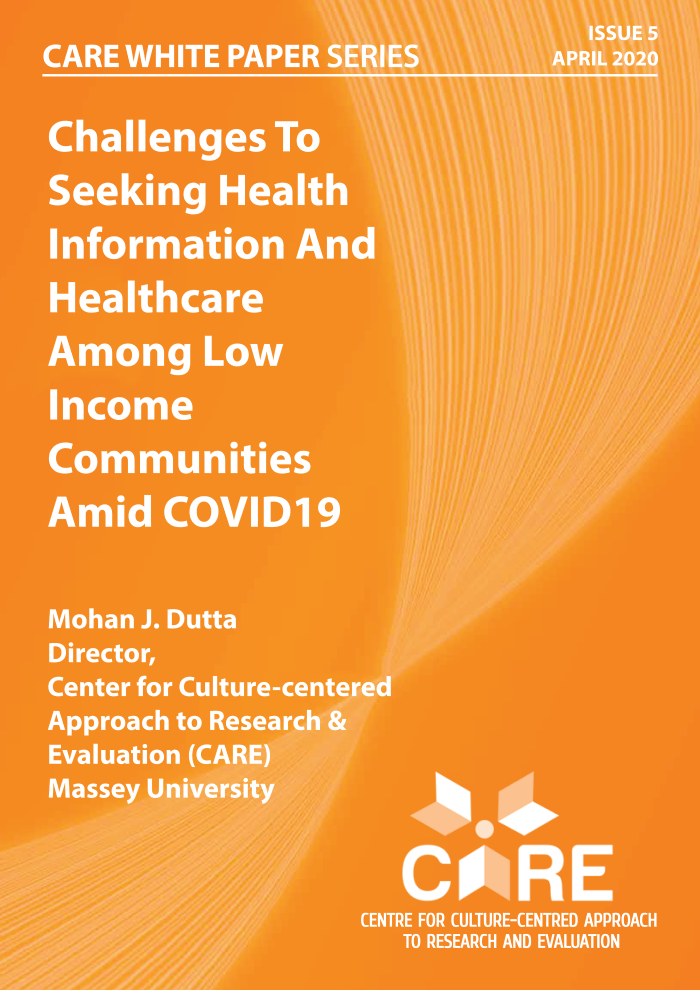
The findings reported here are drawn from our advisory group of community members that represent the community in Highbury. The advisory group has been built on the basis of purposive sampling, ensuring that the voices of the “margins of the margins” are represented. The advisory group meets face-to-face as well as on a digital platform. The group is facilitated by two community researchers, recruited from within the advisory group and trained in the fundamentals of interview-based research.
ISSUE 4. (MARCH 2020)
COVID-19 Wage Subsidy Package
Christine Elers (Ngā Hau), Junior Research Officer, Center for Culture-centered Approach to Research & Evaluation (CARE)
CARE White Paper Issue 4 March 2020Download
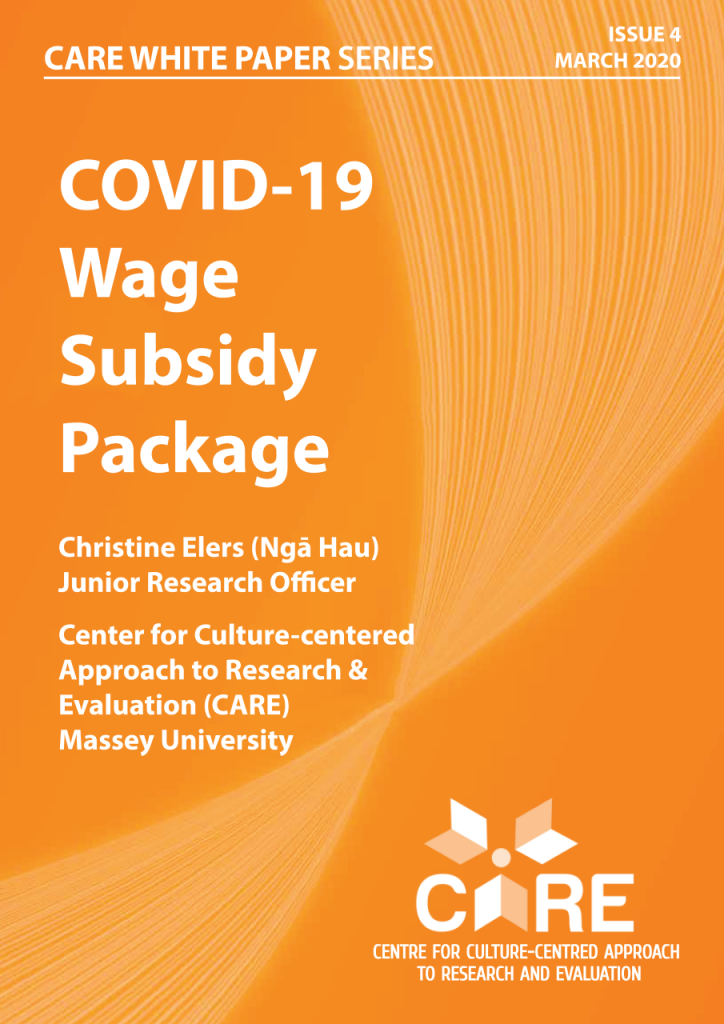
We are writing about the government’s covid-19 wage subsidy package, in particular:
- the sick leave payment due to be folded into the modified covid-19 wage subsidy package; and
- the online publication outlining the names of all employers who have received the covid-19 wage subsidy package.
ISSUE 3. (APRIL 2020)
The limits of the “Singapore Model” in COVID-19 response: Why authoritarian governmentality is not the solution
Mohan J. Dutta, Director, Center for Culture-centered Approach to Research and Evaluation (CARE)
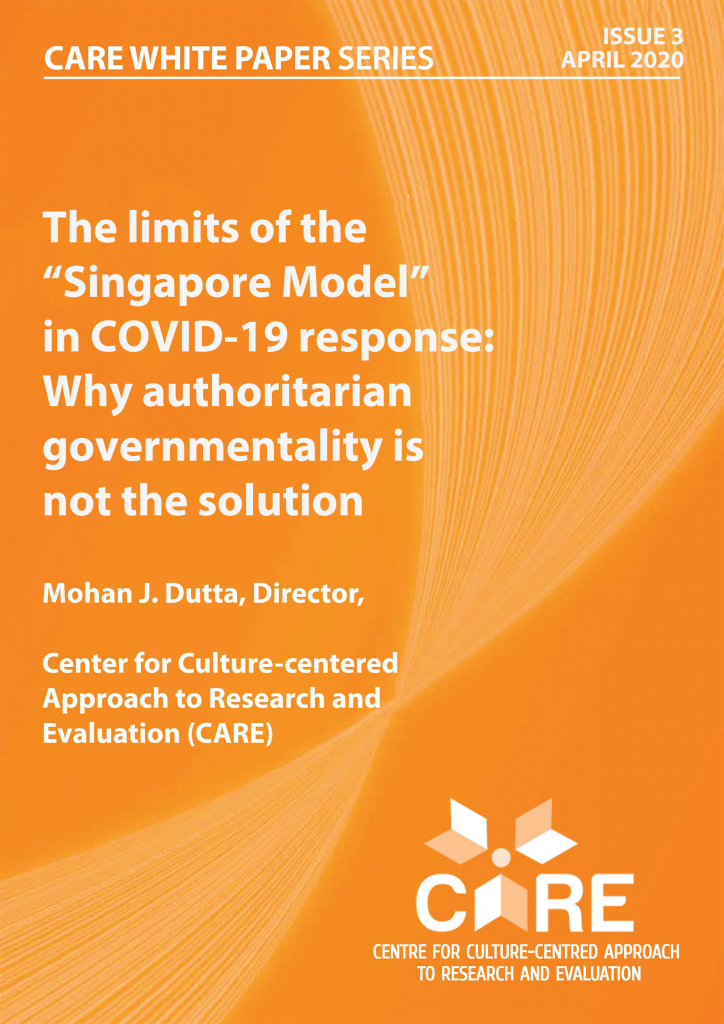
A wide range of models have been proposed as frameworks for responding to Covid-19. These models highlight the significance of health
communication in preventing the spread of COVID19 as well as in effectively responding to it. The positioning of specific models as solutions to COVID-19 is tied to the creation of actual strategies of response
globally. One such model that has been rapidly disseminated in policy discourse and circulated in articulations of COVID response is the “Singapore Model.” Drawing on the key tenets of the CCA, this paper will examine the premise of the “Singapore Model” as a framework for global health.
The white paper draws on the key tenets of the CCA to examine Singapore’s pandemic response. The CCA foregrounds the interplays of culture, structure, and agency in the constructions of health meanings and the development of health solutions.
Structure refers to the political economy of organizing resources in society. Culture reflects the community norms, community-based meanings, and community values guiding relational negotiations of health and wellbeing. Agency reflects the relational and collective capacities of communities to develop solutions.
ISSUE 2. (MARCH 2020)
A culture-centered approach to pandemic response: Voice, Universal Infrastructure, and Equality
Mohan J. Dutta, Director, Center for Culture-centered Approach to Research and Evaluation (CARE)
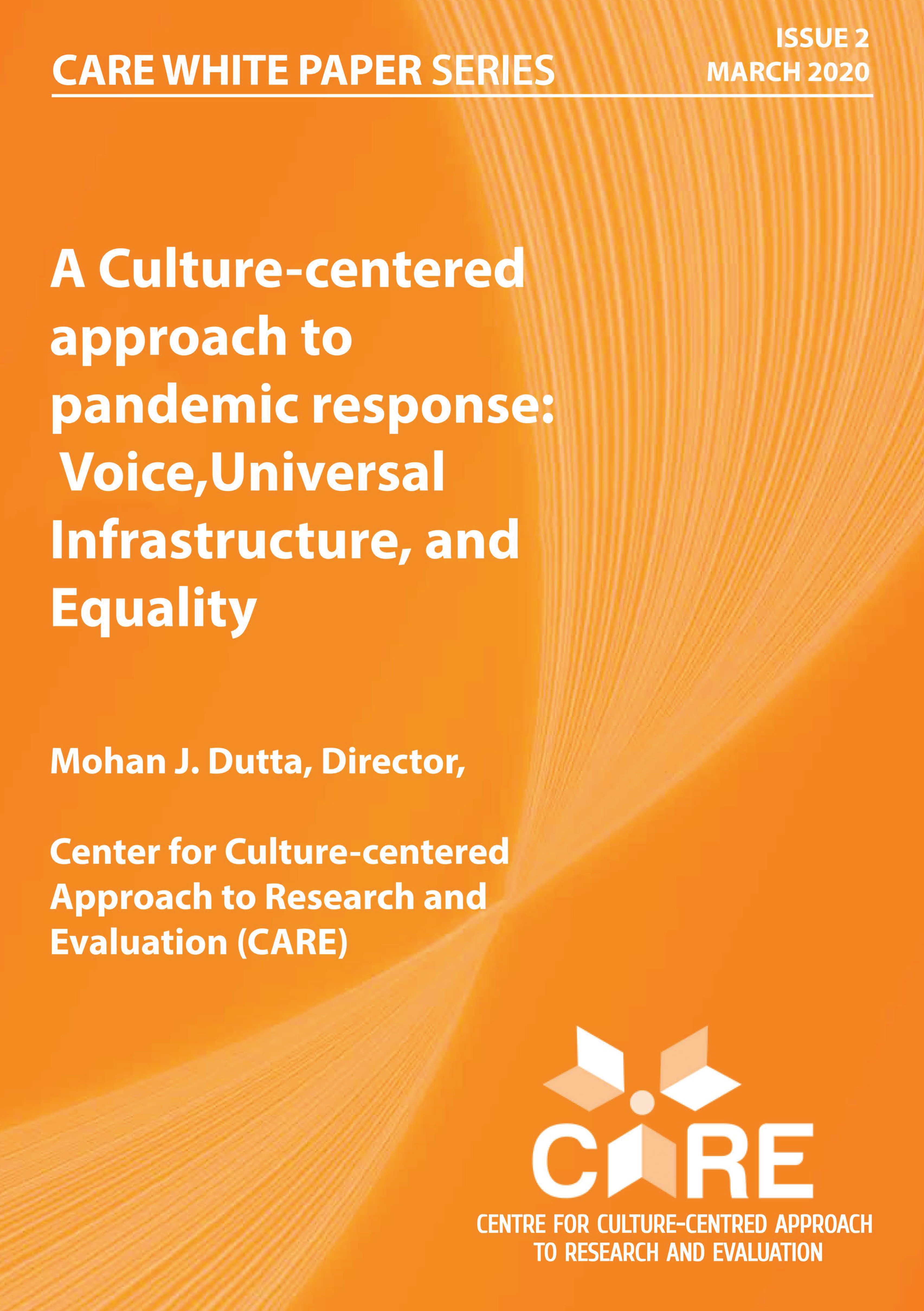
the global nodes of spread of Covid-19 highlight the significance of health communication in preventing the spread as well as in effectively responding to it. On January 30, 2020, the World Health Organization (WHO) declared the outbreak as a Public Health Emergency of International Concern. Noting the aggressive movement of the virus across countries, with eight countries reporting more than 1000 cases of COVID-19, the WHO declared COVID-19 as a pandemic. Drawing on critical analyses of the pandemic and crises response literatures as well as building on the experiences of CARE in developing culture-centered community grounded interventions,this white paper outlines the culture-centered approach to pandemic response, specifically directed at offering culturecentered guidelines for effective communication. The culture-centered approach foregrounds the interplays of culture, structure, and agency in the constructions of health meanings and the development of health solutions.
ISSUE 1. (FEBRUARY 2020)
Exploring challenges: A Culture-Centred Approach (CCA) project in Glen Innes
Dr Phoebe Elers, Dr Steve Elers and Professor Mohan Dutta
This study explores the challenges experienced by residents in Glen Innes, Auckland. The findings have assisted in the identification of local problems and corresponding solutions, including the ‘Poverty is Not Our Future’ campaign, which has served as anchor for residents to challenge dominant structures and, at the same time, communicate their everyday realities of poverty. While this study is focused on Glen Innes, material hardship continues to be a significant issue in Aotearoa New Zealand, with research determining that 13 percent of children lived in households that experienced material hardship in the 2017/18 financial year (Statistics New Zealand, 2019) and that children born into disadvantage in Aotearoa New Zealand have a significant likelihood of remaining disadvantaged (New Zealand Treasury, 2016a, 2016b; Templeton, 2016).
2019
ISSUE 4. (AUGUST 2019)
Ihumātao protest, colonization, and cultural voice
Christine Elers & Prof. Mohan J. Dutta
The erasure of indigenous voice goes hand-in-hand with the occupation of indigenous land. What we witness over the past seven years at Ihumātao, as an extension of over a century of colonialism in Aotearoa, is the deployment of colonial tactics to erase and silence the voices of indigenous Māori peoples. Through a variety of tactics the controls over which are held by the colonizers, Māori voices resisting colonialism are silenced. The very uses of communicative strategies of indigenous participation are deployed in logics established by the colonizer to prop up and perpetuate the colonial-capitalist structure, with the state making claims to having created opportunities for participation. The capitalist interests, served through naturalized logics of the market, reflect the oppressive nature of colonialism, all the while working to erase through the very performance of tools of participation and engagement. In this backdrop, drawing from the ongoing protests at Ihumātao, in this white paper, we attend to the organizing role of indigenous voice as the basis for dismantling colonial capitalism. The Māori voice of resistance in Ihumātao, resounds with indigenous voices in Hawaii, who are protecting their sacred land – Mauna Kea from the construction and intrusion of a giant telescope on the summit. Elsewhere across the globe the plurivocality of resistance offer pathways for addressing the very challenges that have been brought on by the accelerated corporate-colonialism of neoliberal governmentality.
Article: Ihumātao protest, colonization, and cultural voice
2018
ISSUE 3. (DECEMBER 2018)
Strengthening-Refugee-Voices-in-NZ
Dr Murdoch Stephens & Professor Mohan J Dutta
The attached white paper – The state helps the refugee speak: dialogue, ventriloquism or something else? – on the funding of refugee voice organisations was prepared between November 2018 and April 2019. In the wake of the terrorist attacks on two Mosques in Christchurch on 15 March 2019 the need to address the issue of refugee support organisations becomes acute as they a significant role in the representation of many Muslim citizens in New Zealand. Specifically, the lack of funding for organisations that are tasked with connecting with refugee communities and representing those voices to government, media and the public undermined the ability of these organisations to respond after the attacks. We particularly note the absence of “democratic communication infrastructures” owned by refugees for representing their voices in New Zealand. (Stephens and J Dutta, 2019)
Article: Strengthening Refugee Voices in New Zealand
ISSUE2. (NOVEMBER 2018)
Academic-activist partnerships in struggles of the oppressed
Dr. Sue Bradford & Prof. Mohan Dutta
In this advocacy brief, we examine the transformative capacity of collaboration between academics and activists offering a pivotal anchor for local-national-global resistance. In the white paper on academic-activist partnerships, Dr. Sue Bradford and Professor Mohan Dutta draw from their journeys in academia and activist organizing to examine the intersections, synergies, challenges to, and lessons for academic activist partnerships. Questioning the meaning of collaboration and the nature of collaborative spaces in social change, the authors offer a conceptual framework for collaboration that joins in solidarity with the struggles of the oppressed.
Article: Academic-activist partnerships in struggles of the oppressed
ISSUE1. (AUGUST 2018)
Sexual Violence on University Campuses-Communication Interventions
Prof. Mohan J. Dutta & Ms. Braema Mathi
In this advocacy brief, we examine the nature of sexual violence on university campuses, the effects of sexual violence, and the role of communication in preventing as well as responding to sexual violence. Based on our review of the literature, we offer strategies for communication advocacy directed at addressing sexual violence veon university campuses.
Article:Sexual Violence on University Campuses-Communication Interventions
Archives
2016
VOL 2. (APRIL 2016) Dutta, et al., (2016). Culture-Centered Method: The nuts and bolts of co-creating communication infrastructures of listening in communities. CARE White Paper Series, 2 New! Dutta, et al., (2016). Metode-Berbasis Budaya. Culture-Centered Method: The nuts and bolts of co-creating communication infrastructures of listening in communities in Bahasa Indonesia. CARE White Paper Series, 2
VOL 1. (APRIL 2016) Dutta, M., Tan, M., & Rathina-Pandi. (2016). Singaporeans Left Behind: A Culture-Centered Study of the Poverty Experience in Singapore. CARE White Paper Series, 1 New!
2015
VOL 1. (JUNE 2015) Dutta, M. (2015). Food Insecurity and Health of Bangladeshi Workers in Singapore: A Culture-Centered Study. CARE White Paper Series, 1.
2014
VOL 2. (OCT 2014) Dutta, M., Kaur, S. & Comer, S. (2014). “Respect our Rights” – Voices of Foreign Domestic Workers Negotiating Structures. CARE White Paper Series, 2.
VOL 2. (FEB 2014) Teo, D., & Dutta, M. (2014). HIV Prevention Among Men Who Have Sex With Men: A culturally-centered framework for interventions. CARE White Paper Series, 2.
VOL 1. (FEB 2014) Dutta, M., Thaker, J., & Abid, A. (2014). Bt brinjal: A review of key debates. CARE White Paper Series, 1. VOL 1. (FEB 2014) Thaker, J., & Dutta, M. (2014). Bt cotton, scientific studies, and power circuits: Culturally-centering science. CARE White Paper Series, 1.
2013
VOL 1. (MAR 2013) Comer, S., & Dutta, M. (2013). Women’s heart health in Singapore: A culture-centered framework. CARE White Paper Series, 1.
2012
VOL. 1 (AUG 2012) Dutta, M. (2012). A cross-sectional survey of public opinion toward Affordable Care Act in Indiana. CARE White Paper Series, 1. Dutta, M. (2012). US public opinion on healthcare reform: A cross-sectional survey. CARE White Paper Series, 1.
